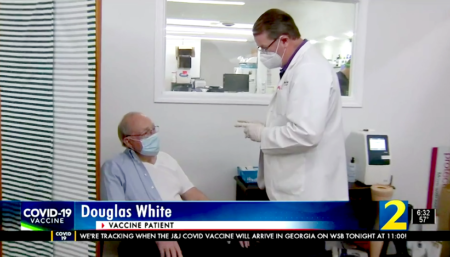The 10% risk, opioids and moms, when placebos work, and more
04 Mar 2021
Posted by Andrew Kantor
The wind is at our backs
It looks like the U.S. will have enough vaccines for everyone — and a few months ahead of schedule. President Biden’s “100 million vaccinations in 100 days” once sounded like a long shot, but now it seems to be aiming low.
The trick, of course, will be turning available vaccines into injected vaccines before one of the nasty variants gets a foothold.
Nobody likes Mondays
But techs can have a better one — by getting out and getting trained in immunization delivery.
Join GPhA on Monday, March 8, from 9:00 am to noon at Southern Crescent Technical College in McDonough [map] for “Immunization Delivery Training for Pharmacy Technicians,” a 5.75-hour CE program consisting of both home-study and live training.
HHS says you can give the Covid-19 vaccines*. If you’re south of Atlanta, get yourself trained do you can do your part!
Click here — then read up, sign up, and show up!
Covid-19 quickies
If you’re exposed at home to someone carrying the virus, there’s a one in 10 chance of catching it yourself — and that’s when you take precautions. “A 10% transmission rate is actually high by many infectious disease standards’ — for example, “Household transmission of the flu can be as low as 1%.”
The Brazilian* variant (P.1) seems to be able to infect people who have already recovered from Covid.
* I know we’re not supposed to use geographic names, but the real designations are hard to keep track of — “ B.1.1.7” “B.1.351” “VOC-202102/02” “Cluster 5.” WHO is working on a better naming scheme, apparently.
Another Alzheimer’s breakthrough
By modulating an enzyme instead of inhibiting it completely, a group of researchers (at the University of California and Mass General) have found they can reduce the formation of Alzheimer’s nasty amyloid plaques.
The trick was to get the γ-secretase enzyme to do the work it’s supposed to do, but produce fewer of the peptides that cause the plaques to form. (Shutting the enzyme down completely is bad news, because it does do important work.)
They found that repeated, low doses of the [treatment] eliminated Aβ42 production in mice and rats, without causing any toxic side effects. The drug was also safe and effective in macaques, reducing Aβ42 levels by up to 70 percent.
Some good opioid news
Kids born to mothers who use opioids are not at risk for birth defects or fetal malformations — at least no more than anyone else. (That’s according to a study out of the University of Texas’s Women’s Health Institute.)
It’s not in your head (it’s all in your head)
So we know the placebo effect is real — people given placebos for pain (“placebo analgesia”) actually do report less pain. But the question: Are they feeling less pain, or do they just think they’re feeling it.
Spoiler: They’re actually feeling less pain. Dartmouth College neuroscientists, working with a team in Germany, did a meta-analysis of studies, and they perused fMRI brain images to see what the brain was actually doing when it got a placebo.
The results showed that parts of the thalamus that are most important for pain sensation were most strongly affected by the placebo. In addition, parts of the somatosensory cortex that are integral to the early processing of painful experiences were also affected.
Short trip
On the other hand… microdosing on LSD has (apparently) become a fad of sorts. It doesn’t let you visit with rocking-horse people or smell the crimson radio stations, but users claim it can “boost the mood, sharpen the mind and get the creative juices flowing.”
But does it really? Why yes, it does. BUT, according to the neuroscientists at Britain’s Centre for Psychedelic Research…
That was only half of the results, however. When the researchers examined what trial volunteers took, they found placebos worked equally as well as the drug. In short, the uplift reported by microdosers might be nothing more than the placebo effect. (Emphasis ours.)
* You can still eat marshmallow pies, though
It’s not ketchup!
Prescribing brand-name drugs instead of generics costs Medicare — i.e., you and me — an additional $1.7 billion a year.
Granted, there are cases when generics don’t work as well for some people, but setting that aside, here’s perspective: That $1.7 billion could pay the average private health insurance premium ($440/month) for 322,000 million people.
Buzz shout-out
GPhA past-president and media celebrity Jonathan Marquess is at it again — this time appearing on WSB-TV, shown giving out the Covid-19 vaccine in a story on J&J’s vaccine coming soon to Georgia.

Here he is, doing well and doing good


